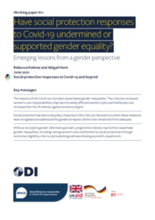This paper draws on two case studies – South Africa and Kerala, India – to discuss the gender implications of social protection responses to Covid-19 in 2020. The impacts of the crisis have been strongly gendered. The rapid onset of the crisis in early 2020 severely disrupted livelihoods, and these impacts were strongly mediated by existing gender inequalities in the labour market, gendered roles and responsibilities around care work, and also household composition. The high number of female-headed households in South Africa, for example, and the role of women as the main providers of food and household care and well-being, meant that women shouldered a disproportionate burden of the crisis. This has been further compounded by the fact that women typically have fewer coping strategies in terms of savings and access to other support compared to men.
The aim of this paper is to examine social protection responses to the crisis from a gender perspective. The research was carried out between October and December 2020, and it draws on a brief global literature review on gender and social protection responses to Covid-19, as well as focusing on two case studies: South Africa and Kerala, India. These case studies were chosen to draw out lessons from adapting social protection in response to the crisis from a gender lens – the top-up to the Child Support Grant (CSG) in South Africa, where the majority of the 7 million recipients are women, and the relatively comprehensive and rapid support provided through the Government of Kerala in collaboration with community and women’s worker organisations. This paper is based on analysis from key informant interviews (KIIs) with researchers and members of civil society organisations from South Africa and Kerala, as well as on published and grey literature on social protection responses in these two contexts.

